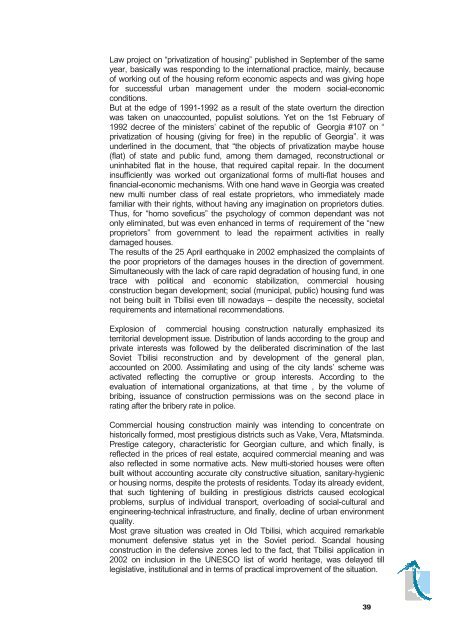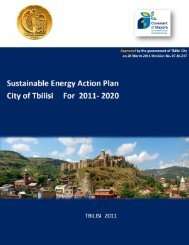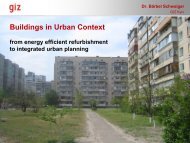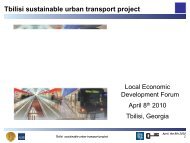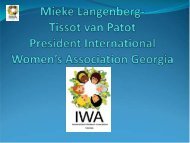LOCAL ECONOMIC DEVELOPMENT PLAN FOR TBILISI ... - LED
LOCAL ECONOMIC DEVELOPMENT PLAN FOR TBILISI ... - LED
LOCAL ECONOMIC DEVELOPMENT PLAN FOR TBILISI ... - LED
Create successful ePaper yourself
Turn your PDF publications into a flip-book with our unique Google optimized e-Paper software.
Law project on “privatization of housing” published in September of the same<br />
year, basically was responding to the international practice, mainly, because<br />
of working out of the housing reform economic aspects and was giving hope<br />
for successful urban management under the modern social-economic<br />
conditions.<br />
But at the edge of 1991-1992 as a result of the state overturn the direction<br />
was taken on unaccounted, populist solutions. Yet on the 1st February of<br />
1992 decree of the ministers’ cabinet of the republic of Georgia #107 on “<br />
privatization of housing (giving for free) in the republic of Georgia”. it was<br />
underlined in the document, that “the objects of privatization maybe house<br />
(flat) of state and public fund, among them damaged, reconstructional or<br />
uninhabited flat in the house, that required capital repair. In the document<br />
insufficiently was worked out organizational forms of multi-flat houses and<br />
financial-economic mechanisms. With one hand wave in Georgia was created<br />
new multi number class of real estate proprietors, who immediately made<br />
familiar with their rights, without having any imagination on proprietors duties.<br />
Thus, for “homo soveficus” the psychology of common dependant was not<br />
only eliminated, but was even enhanced in terms of requirement of the “new<br />
proprietors” from government to lead the repairment activities in really<br />
damaged houses.<br />
The results of the 25 April earthquake in 2002 emphasized the complaints of<br />
the poor proprietors of the damages houses in the direction of government.<br />
Simultaneously with the lack of care rapid degradation of housing fund, in one<br />
trace with political and economic stabilization, commercial housing<br />
construction began development; social (municipal, public) housing fund was<br />
not being built in Tbilisi even till nowadays – despite the necessity, societal<br />
requirements and international recommendations.<br />
Explosion of commercial housing construction naturally emphasized its<br />
territorial development issue. Distribution of lands according to the group and<br />
private interests was followed by the deliberated discrimination of the last<br />
Soviet Tbilisi reconstruction and by development of the general plan,<br />
accounted on 2000. Assimilating and using of the city lands’ scheme was<br />
activated reflecting the corruptive or group interests. According to the<br />
evaluation of international organizations, at that time , by the volume of<br />
bribing, issuance of construction permissions was on the second place in<br />
rating after the bribery rate in police.<br />
Commercial housing construction mainly was intending to concentrate on<br />
historically formed, most prestigious districts such as Vake, Vera, Mtatsminda.<br />
Prestige category, characteristic for Georgian culture, and which finally, is<br />
reflected in the prices of real estate, acquired commercial meaning and was<br />
also reflected in some normative acts. New multi-storied houses were often<br />
built without accounting accurate city constructive situation, sanitary-hygienic<br />
or housing norms, despite the protests of residents. Today its already evident,<br />
that such tightening of building in prestigious districts caused ecological<br />
problems, surplus of individual transport, overloading of social-cultural and<br />
engineering-technical infrastructure, and finally, decline of urban environment<br />
quality.<br />
Most grave situation was created in Old Tbilisi, which acquired remarkable<br />
monument defensive status yet in the Soviet period. Scandal housing<br />
construction in the defensive zones led to the fact, that Tbilisi application in<br />
2002 on inclusion in the UNESCO list of world heritage, was delayed till<br />
legislative, institutional and in terms of practical improvement of the situation.


